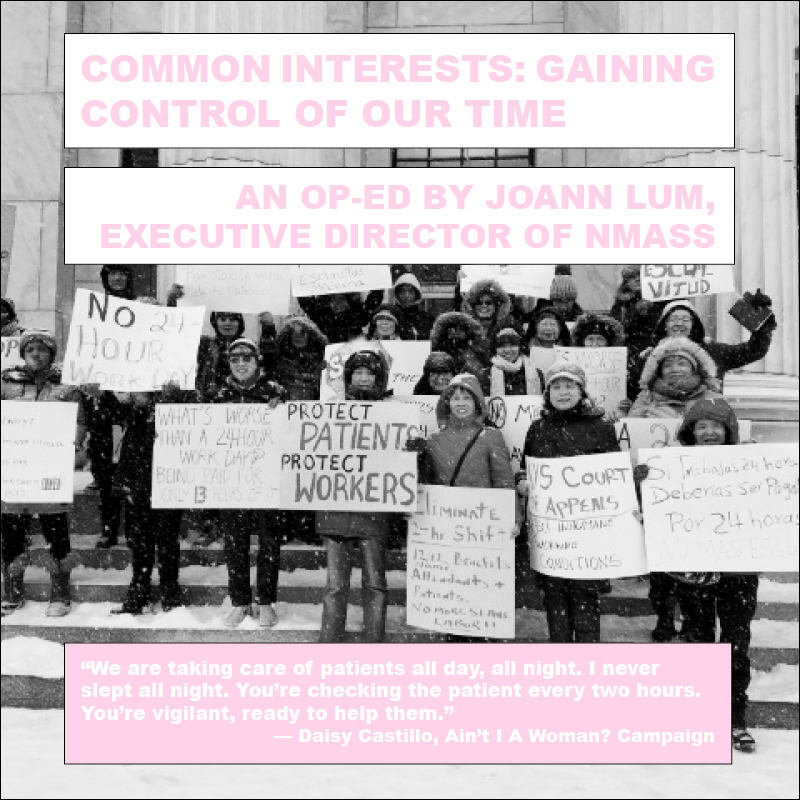An Op-Ed by JoAnn Lum executive director of the National Mobilization Against Sweatshops (NMASS)
Isn’t this May Day the right moment to revive the movement that more than 150 years ago gave genesis to Workers’ Day: the fight for the 8-Hour Day? The continued need for this battle speaks to the realities many of us face today. We are overworked, while others don’t have enough employment. Much of our work like caregiving, community work, and art work is not valued. We are pitted against one another to profit the 1%.
At NMASS’ LES Workers Center we see workers facing these conditions everyday: busboys making $3 an hour and being stiffed of their tips by their bosses; home care workers working 24-hour shifts, sometimes 4 days a week, and getting paid for only 13 of those hours.
Locally and nationally, we’re seeing flaring divisions among workers. Unscrupulous employers are taking advantage of Trump’s immigrant bashing to extract more from immigrants and workers of color especially. However, this began and continued way before Trump. The employer sanctions provision of the Immigration Reform and Control Act of 1986 created an underclass with no rights, permitting the super-exploitation and abuse of undocumented immigrants. The law divided the working class, pitting citizens against immigrants, thus driving pay and conditions down for everyone. With Trump in office, this race to the bottom is even more apparent as wages drop and work-related health problems once thought to be in decline, like black lung disease in Appalachia, rise.
Democrats like Andrew Cuomo and Bill de Blasio claim to protect immigrants, women, and workers with sanctuary. But what is a sanctuary city when de Blasio’s pro-development agenda displaces more and more working people every day? What is sanctuary when Cuomo’s Department of Labor (DOL) promotes the inhuman policy of legalizing 24-hour work shifts for 13 hours of pay? We recently saw the NYS Court of Appeals defer to DOL’s interpretation of the wage order that allows employers to exclude payment from workers if they’re able to sleep an appropriate (at least 5 hours uninterrupted) amount and take meal breaks during their shift. This despite countless workers testifying that they are unable to sleep through the night since the people in their care often have medical conditions that require around-the-clock attention. In a dissenting opinion, Associate Judge Michael Garcia called the decision “unfair” and said the court incorrectly interpreted the role of home health care workers in relation to the wage order. Judge Garcia went further in stating that “DOL’s interpretation of the wage order not only enables this mistreatment of home health care aides, it directly affects their livelihood: with 11 hours of pay deducted from their earnings, home health care aides are paid an hourly rate less than the statewide minimum wage.”
Day-to-day, working people are coming together to protect our health, our communities and our right to control our time and lives. Right now, home attendants are leading a political fight to end the inhuman 24-hour day in the home care industry, paving the path for more workers to stand up against long work hours. Through the Ain’t I a Woman?! campaign, we are sending a message that none of us should be forced to work overtime. Working people are fighting against all odds to demand systemic change that go beyond top-down reforms that undercut the fight for the 8-hour day (8 hours to work, 8 hours to rest, 8 hours to do as we like) in exchange for overtime pay.
In N.Y. state, 93% of home care workers are women; 79% are immigrants and women of color. Here at NMASS, we’ve been working together with home care workers from Honduras, Mexico, China, and the Dominican Republic as well as with African Americans, whites and Puerto Rican citizens. We work together to fight to end the inhumane conditions in which they are forced to work and we are uniting with others including the families of those they care for; other workers, women’s groups and disability rights groups, to say enough is enough. Ending 24-hour workdays is in the interest of all working people.
We are galvanizing more workers to bring lawsuits and file complaints to recover their withheld wages. We are also calling for the right to end mandatory overtime, working with legislators to prohibit the 24-hour workday for home care workers and implement split shifts so two or more workers can provide around-the-clock care. This way, people can receive proper care and workers can go home, rest and see their families, returning to work with more energy and attention.
Uniting the working class means that we can fight together for our common interests. Gaining control of our time, we can come together to fight for better working conditions, more say in our communities and healthier working and living conditions for us and our families. By valuing the work that we do, we can lay the groundwork for more fundamental change.

Leave a Reply